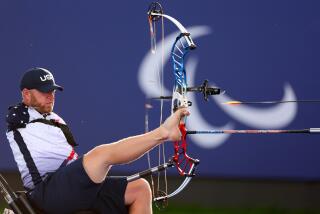In Darkness, His Competitive Light Shines : Judo: Lynn Manning lost his sight to a bullet, but not his desire to win at life. Now he has earned a gold medal in the World Games for the Disabled.
- Share via
Twelve years ago, Lynn Manning was fighting for his life. A gunshot to the head nearly killed him and left him blind.
Last month, he gained international recognition by winning a gold medal in judo at the World Games for the Disabled in the Netherlands.
Ironically, the events that accompanied his troubled childhood might have been most responsible for leading him beyond the limits of his disability and into that judo final.
Although Manning defeated a Soviet competitor for the gold, he had considered quitting competitive judo, after a disappointing fourth-place finish in the 1988 Paralympics in Seoul.
“Lynn made some mistakes in Korea (at the Paralympics), but he learned from them and has begun to play smarter,” said Manning’s coach, Neil Ohlenkamp. “Just like he fought through his life, he’s fought his way to the top in judo. . . . The guy simply never gives up.”
Ohlenkamp was confident that Manning would bounce back after the Paralympics, but his judoist wasn’t so sure.
“It was a severe disappointment to me, and I felt that it was a disappointment to the people who supported my going as well,” Manning said. “I was thinking about that when I went to the Netherlands for the World Championships.
“The ultimate fear was that I wasn’t going to be able to bring back the gold this year, either. All I could see was coming back empty-handed again. I couldn’t let that happen.”
Manning’s victory in July might have brought him some recognition, but his athletic achievements are only part of the story.
Manning, 35, grew up in South-Central Los Angeles in a single-parent household of nine children. He says there were men around the home but none stayed long.
When Manning was 9, the family was split up and he was sent to the first of five foster homes.
“My mother was (a 29-year-old) alcoholic with nine kids between 18 months and 10 years, and it was a bit too much for her,” Manning said.
Despite a lack of parental support, however, Manning excelled in school, making the honor society in junior high and finishing high school with a B average.
After graduation, he enrolled at Los Angeles City College, studying architecture at first, then changing to art. But the home problems continued.
“(My mother) had been in and out of institutions,” Manning said. “And since then, she’s been to prison a couple of times. . . . Her story’s pretty rocky, but I’m still in touch with her.”
Manning had taken a few classes at L.A. City when he began working as a juvenile counselor at the McCobb home for boys. About the same time, his art career began to blossom and he had sold a few drawings on commission. Then his life took a nasty turn.
“I had just worked four days at the boys’ home and had the next two days off and I went to a bar on Vine Street to have a few beers,” Manning said.
“This guy wanted to pick a fight with me, and since the bartender didn’t do anything about it, I threw him out myself. A half hour later, he came back with a gun and shot me behind the left eye and the bullet lodged in the other side of my head.”
His sight was gone and his art career apparently was over.
“I said, ‘OK, what am I going to do now?’ ” he said. “My background was pretty rocky anyway. I was used to losing things, having them snatched away at the last moment. So that didn’t come as a major shock. I just had to get used to losing my sight.”
Manning had always enjoyed literature and decided to try writing poetry.
He has had several poems published and hopes to sell a book of poetry and an autobiography that he has been working on for more than two years.
“I recognize the things I’ve overcome, but I can’t imagine myself not doing it,” Manning said. “I can’t imagine myself doing anything else. You have to give it all, at anything you ever wanted to accomplish. If I didn’t do it, then it wouldn’t be done. It’s something I don’t think twice about.”
Manning has been married for three years and lists his marriage as one of his proudest accomplishments.
“I want to make a positive contribution to my world,” he said. “I hope to be a positive influence in the lives of anyone I come in contact with, whether through the written word or through sharing a couple of beers across a bar.
“I think if you have anything as an individual to contribute on a one-to-one level, then you affect the globe as a whole,” he said.
“To say you can’t effect change is to say you can’t affect one person in your lifetime.”
And Manning seems to have done that.
More to Read
Go beyond the scoreboard
Get the latest on L.A.'s teams in the daily Sports Report newsletter.
You may occasionally receive promotional content from the Los Angeles Times.






